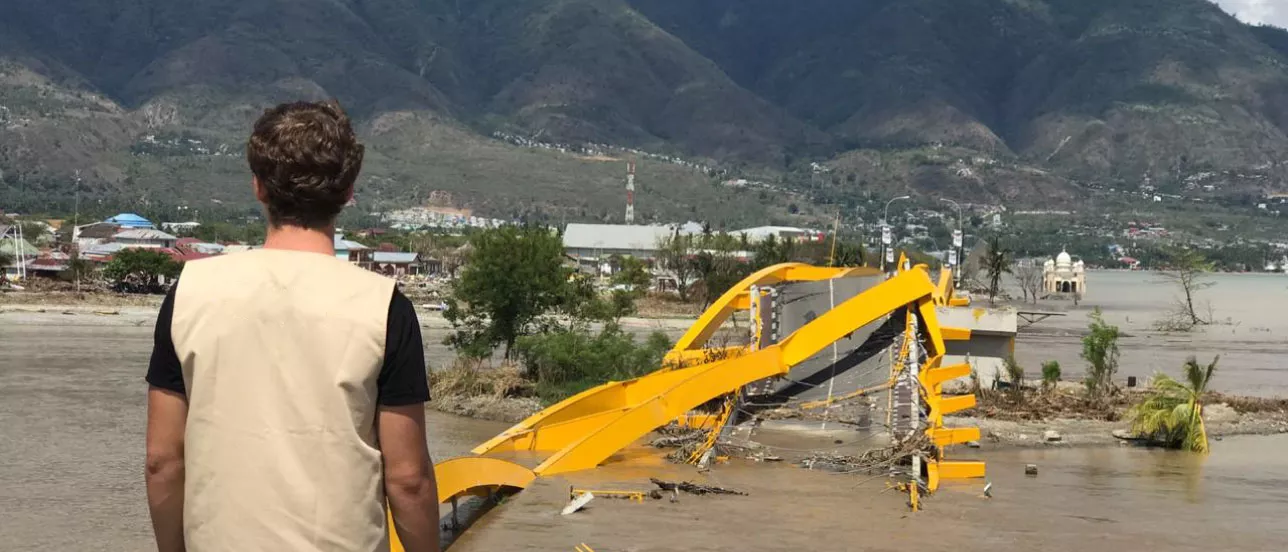Disaster Risk Management and Climate Change Adaptation - Master's Programme
Master's programme · 2 years · 120 credits

Description
The trend of increasing disasters and related losses are global challenges. The changing global risk landscape due to various processes of change such as climate change, urbanisation, and the increasing complexity of modern society poses major challenges for sustainable development and must be addressed with an interdisciplinary approach. A growing number of governments and international organisations acknowledge the necessity to increase their efforts in disaster risk management and climate change adaptation to successfully adjust to changing environments and develop sustainable societies. The Master’s programme in Disaster Risk Management and Climate Change Adaptation has support from national and international authorities, NGOs, UN agencies, and the Red Cross/Red Crescent Movement.
Special features of the programme:
The programme contributes to meeting the need for qualified professionals who can:
- contribute to resilient and sustainable societies through use of interdisciplinary concepts, methods and tools within disaster risk management and climate change adaptation
- apply skills in resilience, risk assessment, risk communication, capacity assessment, risk-based land use planning, preparedness and contingency planning and disaster response management
- work with capacity development and project design for disaster risk management and climate change adaptation in local, national and international organisations or agencies
- utilise and contribute to research in this field
The programme offers a mix of practical and theoretical learning with a strong focus on group work and interaction between students and teaching staff as well as with important actors within this field of study. Examples of the latter are the involvement of experts from national and international organisations in some of the courses and the possibility of taking an elective internship-based course. The programme has connections with potential hosts for interns, where students can apply, and for students conducting research for their Master’s thesis within the UN-system, the Red Cross/Red Crescent movement and Governmental agencies on different administrative levels in various parts of the world. Students come from all over the world and from various academic disciplines, such as engineering science, social science, political science, natural science and environmental science. Even if previous work experience is not a requirement to enter the programme, most of our students have professional or volunteer experience.
Programme courses:
Mandatory courses
- Societal Resilience
- Foundations for Risk Assessment and Management
- Capacity Development
- Introduction to Disaster Response Management
- Risk Based Land Use Planning
- Climate Smart Risk Reduction
- Preparedness and Planning
- Risk Perception, Communication and Human Behaviour
- Critical issues in Disaster Risk Management and Climate Change Adaptation
- Research Methodology
- Master’s degree project
Information about the courses of the programme - lth.se
Information about the programme overview, structure and courses- lth.se
Career Prospects:
Students graduating from the Master’s programme in Disaster Risk Management and Climate Change Adaptation will be attractive for a career with actors contributing to a more resilient and sustainable society, everything from local and national authorities, NGOs, private sector, academia and think tanks to international actors as well as private consultancies. Graduates have acquired a broad understanding of the complex and dynamic field, of proactive and reactive approaches and have an ability to apply skills and generic tools in various working contexts. They will be a bridge between risk/climate experts, project managers and policymakers. The programme provides qualifications for both professional activities in society and for research studies at PhD level. The network of organisations supporting the programme emphasised the need for professionals with qualifications in e.g. resilience, risk assessment and management, risk communication, preparedness/contingency planning and capacity development.
Programme sheets
Closed for applications
Application opportunitiesClosed for applications
Learn more about our application periods and when to apply for studies at Lund University.
Programme overview for this Master's
See the programme overview for Disaster Risk Management and Climate Change Adaptation on the Faculty of Engineering’s website.
Learn more about the DRMCCA field-based internship course
Possible hosts, destinations and internship experiences.
Career prospects for DRMCCA students
Alumni survey, interview with the programme directors and voices from supporting organisations.
Contact
Programme Director
Magnus Hagelsteen
Email: msc [dot] drmcca [at] lth [dot] lu [dot] se
International Coordinator
Cecilia Bruhn
Email: msc [dot] drmcca [at] lth [dot] lu [dot] se
Requirements and selection
Entry requirements
A Bachelor’s degree with relevance to the applied education. English 6.
Selection criteria
The selection is based on academic qualifications and on a statement of purpose.
English language requirements
Most of Lund University’s programmes require English Level 6 (unless otherwise stated under 'Entry requirements'). This is the equivalent of an overall IELTS score of 6.5 or a TOEFL score of 90. There are several ways to prove your English language proficiency – check which proof is accepted at the University Admissions in Sweden website. All students must prove they meet English language requirements by the document deadline, in order to be considered for admission.
How to prove your English proficiency – universityadmissions.se
Country-specific requirements
Check if there are any country-specific eligibility rules for you to study Bachelor's or Master's studies in Sweden:
Country-specific requirements for Bachelor's studies – universityadmissions.se
Country-specific requirements for Master's studies – universityadmissions.se
Apply
Start Autumn Semester 2025
Day-time Lund, full time 100%
In English
Study period
1 September 2025 - 6 June 2027
Application
Closed for applications
How to apply
Lund University uses a national application system run by University Admissions in Sweden. It is only possible to apply during the application periods.
Step 1: Apply online
- Check that you meet the entry requirements of the programme or course you are interested in (refer to the section above on this webpage).
- Start your application – go to the University Admissions in Sweden website where you create an account and select programmes/courses during the application period.
Visit the University Admissions in Sweden website - Rank your programme/course choices in order of preference and submit them before the application deadline.
Step 2: Submit documents
- Read about how to document your eligibility and how to submit your documents at the University Admissions in Sweden website. Follow any country-specific document rules for Master's studies or Bachelor's studies
Country-specific requirements for Bachelor's studies – universityadmissions.se
Country-specific requirements for Master's studies – universityadmissions.se
- Get all your documents ready:
- official transcripts and high school diploma (Bachelor's applicants)
- official transcripts and degree certificate or proof that you are in the final year of your Bachelor's (Master's applicants)
- passport/ID (all applicants) and
- proof of English proficiency (all applicants).
- Prepare programme-specific documents if stated in the next paragraph on this webpage.
- Upload or send all required documents to University Admissions before the document deadline.
- Pay the application fee (if applicable – refer to the section below on this webpage) before the document deadline.
* Note that the process is different if you are applying as an exchange student or as a part of a cooperation programme (such as Erasmus+).
* If you have studied your entire Bachelor's programme in Sweden and all of your academic credits are in Ladok, you do not have to submit transcripts or your diploma when applying for a Master's programme. However, there may still be other documents you need to submit! See the link below.
* Svensk student?
Läs instruktionerna om att söka till ett internationellt masterprogram på lu.se
Programme-specific documents
In addition to the documents mentioned under Step 2, you must also submit a CV and a statement of purpose when you apply for this programme. The statement of purpose (but not the CV) forms part of the selection criteria along with your academic qualifications. You must use the web form 'Summary sheet and statement of purpose' when submitting the statement of purpose (link below). The statement of purpose should not be longer than 10,000 characters. Relevant aspects include:
- your main interests in the field of disaster risk management and climate change adaptation
- how your Bachelor’s degree relates to the field
- what you hope to benefit from studying the programme
- your plans after completion of the programme
To submit the document 'Summary sheet and statement of purpose', you need to:
- Fill in our template.
- Save the template as a PDF.
- Upload the PDF to your account at universityadmissons.se.
Applicants should also provide an official explanation of the grading scale of their Bachelor’s degree (this could be in the form of a link to a website), if such an explanation is not printed on the transcript.
You are not required to submit letters of recommendation when applying to this programme.
Tuition fees
Non-EU/EEA citizens
Full programme/course tuition fee: SEK 340 000
First payment: SEK 85 000
Citizens of a country outside of the European Union (EU), the European Economic Area (EEA) and Switzerland are required to pay tuition fees. You pay one instalment of the tuition fee in advance of each semester.
Tuition fees, payments and exemptions
EU/EEA citizens and Switzerland
There are no tuition fees for citizens of the European Union (EU), the European Economic Area (EEA) and Switzerland.
Application fee
If you are required to pay tuition fees, you are generally also required to pay an application fee of SEK 900 when you apply at the University Admissions in Sweden website. You pay one application fee regardless of how many programmes or courses you apply to.
- Paying your application fee – universityadmissions.se
- Exemptions from paying the application fee – universityadmissions.se
- Convert currency – xe.com
*Note that there are no tuition or application fees for exchange students or doctoral/PhD students, regardless of their nationality.
Scholarships & funding
Lund University Global Scholarship programme
The Lund University Global Scholarship programme is a merit-based and selective scholarship targeted at top academic students from countries outside the EU/EEA.
Lund University Global Scholarship
Within the framework of the Lund University Global Scholarship programme, the University also offers the African Research Universities Alliance (ARUA) Scholarship targeted at top academic students from selected African research universities.
Swedish Institute Scholarships
The Swedish Institute offers scholarships to international students applying for studies in Sweden at Master's level.
Scholarship information on the Swedish Institute website
Country-specific scholarships and funding options
Lund University has agreements with scholarship organisations and funding bodies in different countries, which may allow applicants to apply for funding or scholarships in their home countries for their studies at Lund University.
External scholarships
Testimonials about this Master's

Meet our student ambassador Fleur
Read her testimonial and chat with her via Unibuddy.

Testimonials from alumni
Read full interviews with alumni of this programme.

Testimonials from students
Voices from first-and second-year students.

Interview with the programme director
Magnus Hagelsteen's words about the DRMCCA Master's.